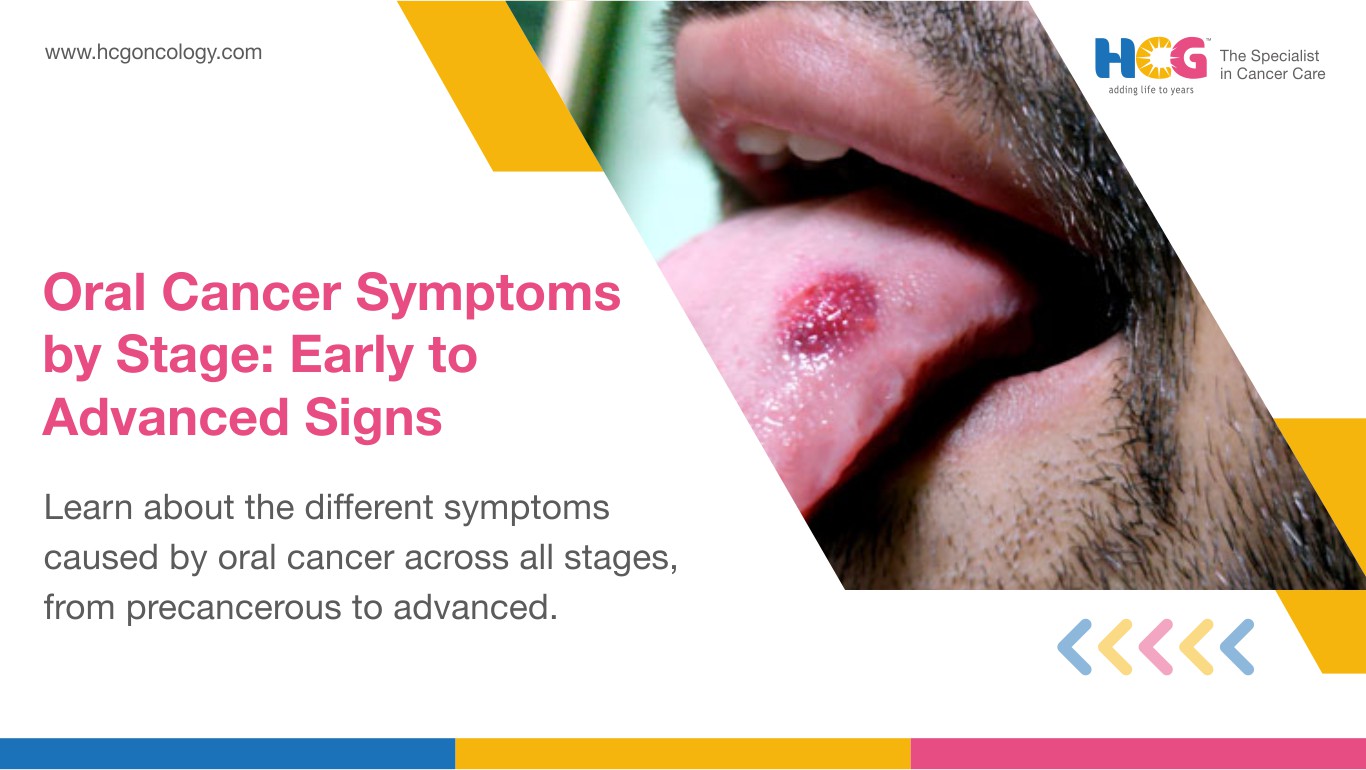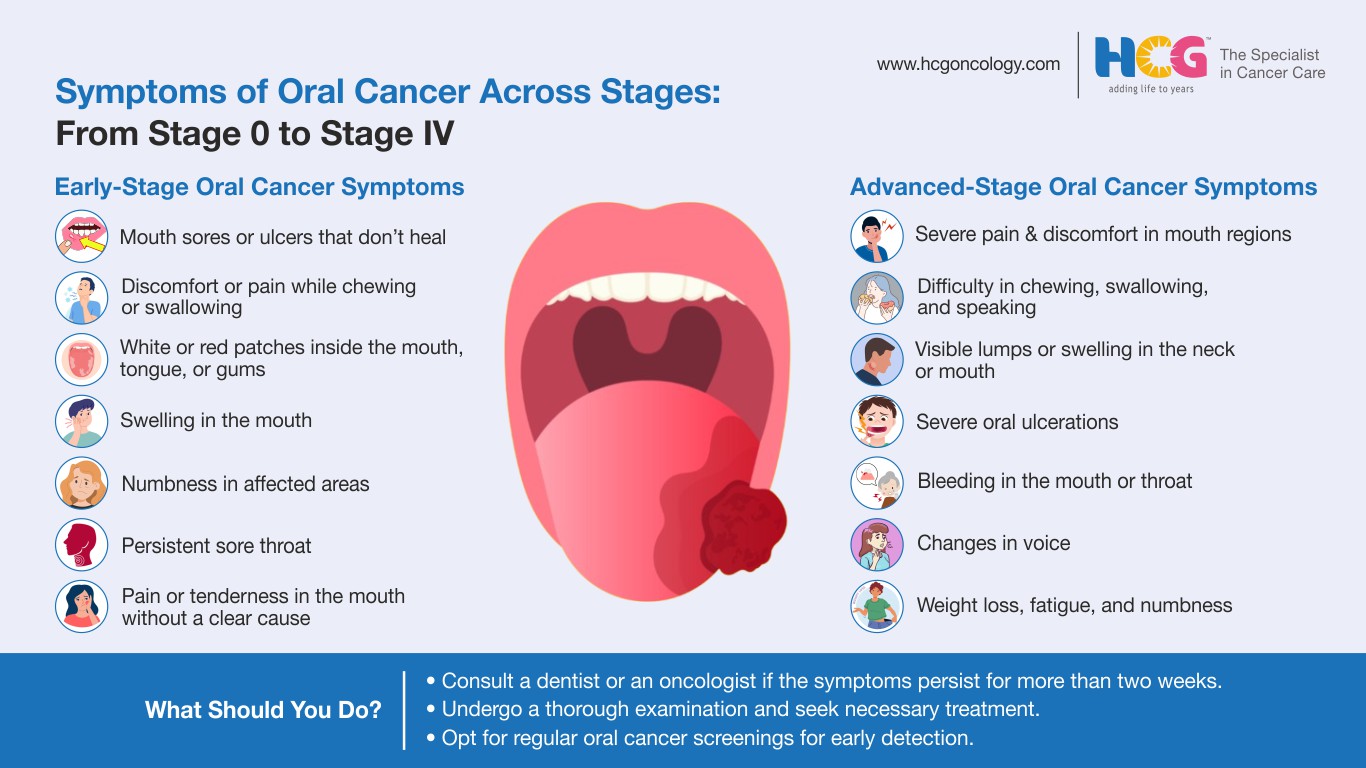
22 Dec, 2025
Feel free to reach out to us.

22 Dec, 2025

This article is medically reviewed by Dr. Nitin Bomanwar, Associate Director - Surgical Oncology, HCG Cancer Centre, Nagpur.
Oral cancer is a type of cancer that develops in the tissues of the mouth or throat. It generally affects areas such as the lips, tongue, gums, and the area of the throat at the back of the mouth. Oral cancer most often occurs in people over the age of 40 and affects more than twice as many men as women.
Oral cancer stages start from stage 1 to stage 4. In stage 1, the cancer is only on the surface, and in stage 4, it spreads to the other parts of the body.
Most cancers in the mouth occur due to the use of tobacco, drinking alcohol, or both, and most throat cancers are caused by the human papillomavirus (HPV). The incidence of HPV-positive oral cancer has risen in recent years.
Precancerous oral cancer symptoms are the early signs of oral cancer. Early-stage oral cancer is very crucial to diagnose, as it can help in the early detection of cancer and treatment.
The symptoms of oral cancer may vary from one patient to another. In precancerous stages, patients may not experience any warning signs of oral cancer. Commonly observed oral cancer symptoms include persistent sores or ulcers in the mouth. In the beginning, patients may also notice red or white patches inside the mouth, gums, or tongue; these are the common oral cancer symptoms.
Other precancerous oral cancer symptoms include unexplained bleeding in the mouth or persistent pain in the throat or ears. If you experience any oral cancer signs and symptoms, it's essential to consult with a healthcare provider for further evaluation and early intervention.
Oral cancer symptoms can change from stage to stage, depending on the extent of the disease’s spread. Understanding the stages of oral cancer is essential for informed health decision-making. Here are some symptoms of oral cancer based on stages of oral cancer.

In the early stage of oral cancer, patients may or may not experience any symptoms. In this stage, the cancer is localized, generally very small, and has not spread to lymph nodes and other tissues.
Stage 1 oral cancer symptoms include:
In stage 2, the cancer grows larger but still has not reached the lymph nodes, but in stage 3, the cancer may spread to the nearby lymph nodes.
Stages 2 and 3 oral cancer symptoms include:
Stage 4 oral cancer is the most advanced stage of oral cancer. In this stage, the disease would have spread to the nearby and distant organs in the body.
Oral cancer stage 4 symptoms can be severe and include:
There are some other signs and symptoms of oral cancer that individuals should be aware of. Identifying these oral cancer symptoms can play a crucial role in effective treatment.
If you notice consistent oral cancer symptoms such as soreness or ulcers in the mouth that don’t heal within two weeks, feeling difficulty swallowing or chewing, redness in the mouth, or persistent pain in the mouth, jaw, or throat, you should immediately consult an oncologist about oral cancer symptoms.
It is important to note that oral cancer first-stage symptoms can be subtle, and therefore, individuals must also consider regular oral cancer screening/check-up for early detection.
Thanks to the latest advancements in oral cancer treatment, today we can treat oral cancer cases, irrespective of their stages, with excellent health outcomes.
Understanding what is oral cancer and the signs and symptoms of oral cancer is imperative for early detection and successful treatment. Oral cancer symptoms can vary depending upon the stage of the cancer. Stage 1 cancer symptoms are very mild and often not noticeable. As the cancer spreads to the lymph nodes and other parts of the body at stage 4 of oral cancer, there is pain, difficulty swallowing, lumps, and noticeable swelling in the neck or jaw, along with unintended weight loss and fatigue. Understanding the warning signs of oral cancer plays a critical role in informed decision-making. If you notice these early signs of oral cancer, you should consult an oncologist.

Dr. Nitin Bomanwar
Associate Director - Surgical Oncology
MBBS, MS, MCh (Surgical Oncology)
Dr Nitin Bomanwar is a highly experienced cancer surgeon who is available for consultations at HCG Cancer Centre, a leading cancer hospital in Nagpur. He specializes in head & neck cancer surgery and reconstruction. He also has specialized expertise in performing curative and palliative surgery to manage gastric and colorectal cancers; other abdominal and digestive cancers (pancreatic and liver); urological cancers, including kidney, bladder, and prostate; breast malignancy and reconstruction; thoracic surgery; soft tissue tumors; and melanoma.
Appointment Link: Book an Appointment with Dr. Nitin Bomanwar